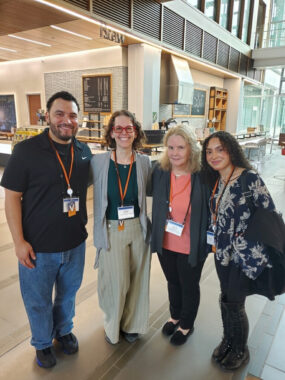A conversation with Iván Girón, superstar dad and parent advocate
How a father advocates for his daughter with hemophilia A
Written by |

This Father’s Day, as we celebrate the role of fathers in our lives, I can think of no one more deserving of recognition in our bleeding disorders community than Iván Girón.
At Genentech’s Rare Blood Disease Summit in San Francisco last year, I was immediately drawn to Iván and his beautiful daughter, Naomi. They were seated on the opposite side of the room, and their connection to the program piqued my curiosity. Little did I know that their story would leave a lasting impression on me.
Iván lives with moderate hemophilia A, and his story is truly inspirational. However, instead of focusing on his own journey, Iván delivered an inspiring talk about his advocacy efforts for his daughter. I was beyond impressed. It brought me back to the bleeding problems I experienced during childhood, and how it was my dad who would sigh and say, “This isn’t normal,” and call the doctor.
I recently interviewed Iván over chat and email. Excerpts from our conversation follow.
JL: Can you share a bit about yourself?
IG: I live in Southern California and have moderate hemophilia A. I am married and have three kids. I currently work in a pharmacy with patients with bleeding disorders. I volunteer my time to my community and have actively supported the bleeding disorders community.
Tell us about your daughter.
I have a 19-year-old daughter, Naomi, with mild hemophilia A. She was diagnosed at the age of 11.
At what point did you think she might have hemophilia?
When my daughter was 8 years old, she sprained her ankle. It got swollen and painful, just like my ankles did when I was her age, though not as severe. It took her a few days before she could put weight on it, and I knew something wasn’t right. When she was 11, she had her first menstrual cycle, and that’s when we knew her bleeding was abnormal.
Tell us about your journey of having her diagnosed and treated.

From left, Iván Girón, Shellye Horowitz, Jennifer Lynne, and Naomi Girón attend Genentech’s Rare Blood Disease Summit in San Francisco, in September 2023. (Courtesy of Jennifer Lynne)
The diagnosis wasn’t difficult. I spoke to the doctors and told them it was necessary to check her [factor] levels.
My journey to get her proper treatment was not an easy one. Initially, the doctors were reluctant to prescribe factor for her. Instead, they recommended tranexamic acid [known as Lysteda or Cyklokapron] and Stimate [desmopressin acetate]. While both medications have their own effectiveness, they also come with numerous unpleasant side effects. The doctors suggested birth control, but we were not interested. We requested factor multiple times but were denied.
I then decided to look for a hematologist specializing in treating women. Fortunately, I found a hemophilia treatment center about two hours away from my home in California, where we met a great doctor. I accompanied my daughter to her appointment, bringing a folder with documentation of her bleeding episodes. This helped the doctor understand why factor treatment would be beneficial for her.
What advice do you have for other dads in a similar situation with their daughters?
Be present in your daughter’s journey. They need us there for support. Get involved in your local chapter and bleeding disorders community and learn.
What else would you like to add?
The only way we, as patients, can get proper care is if we are willing to advocate at the right time.
Thank you, Iván!
Note: Hemophilia News Today is strictly a news and information website about the disease. It does not provide medical advice, diagnosis, or treatment. This content is not intended to be a substitute for professional medical advice, diagnosis, or treatment. Always seek the advice of your physician or another qualified health provider with any questions you may have regarding a medical condition. Never disregard professional medical advice or delay in seeking it because of something you have read on this website. The opinions expressed in this column are not those of Hemophilia News Today or its parent company, Bionews, and are intended to spark discussion about issues pertaining to hemophilia.



Leave a comment
Fill in the required fields to post. Your email address will not be published.